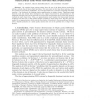576 search results - page 35 / 116 » Approximate controllability of a reaction-diffusion system |
AIPS
2004
13 years 11 months ago
2004
We describe and evaluate a system for learning domainspecific control knowledge. In particular, given a planning domain, the goal is to output a control policy that performs well ...
ICCS
2001
Springer
14 years 2 months ago
2001
Springer
Nowadays, people start to accept fuzzy rule–based systems as flexible and convenient tools to solve a myriad of ill–defined but otherwise (for humans) straightforward tasks s...
CDC
2009
IEEE
14 years 2 months ago
2009
IEEE
Abstract— Q-learning is a technique used to compute an optimal policy for a controlled Markov chain based on observations of the system controlled using a non-optimal policy. It ...
HYBRID
2010
Springer
14 years 4 months ago
2010
Springer
This paper is concerned with reachable set computation for non-linear systems using hybridization. The essence of hybridization is to approximate a non-linear vector field by a s...
CORR
2004
Springer
13 years 9 months ago
2004
Springer
We consider linear systems arising from the use of the finite element method for solving a certain class of linear elliptic problems. Our main result is that these linear systems, ...

